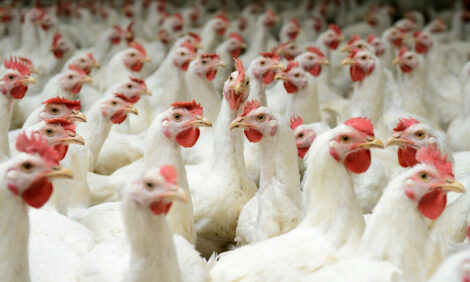



Significant Improvement in Cargill Earnings
US – Global meat and agrifood businessCargill has reported net earnings of $483 million in the fourth quarter of the 2013 financial year ended 31 May.The result is up substantially from $73 million in the same period a year ago.
Fourth-quarter revenues were $35.4 billion, a four per cent increase from $34 billion in the year-ago period.
For the full financial year, Cargill earned $2.31 billion, nearly double the $1.17 billion in the previous year.
Revenues reached $136.7 billion, up two per cent from last year’s $133.9 billion.
Cash flow from operations was $4.18 billion, a 19 per cent increase from $3.51 billion in fiscal 2012.
“Cargill’s earnings improved significantly over the prior year,” said Greg Page, Cargill chairman and chief executive officer.
“Nearly all of our business units were profitable, and more than two-thirds exceeded year-ago results. We did a better job of delivering innovations and solutions that help our customers succeed. We also drew on our sourcing, logistical and risk management skills to navigate volatile commodity markets in the first half that were driven by severe weather.”
Mr Page said recent changes taken by the company also have made a noticeable difference.
“We took action to increase our speed and agility, while holding costs in line. We invested in assets that expand Cargill’s global reach and capabilities, and that support our customers as they seek to grow in new markets.”
Cargill currently has $2.6 billion of major agricultural, food and energy projects under construction, near completion or recently opened in 14 countries around the world.
These include a poultry further-processing plant in Efremov, Russia; an integrated poultry production and processing complex in China’s Anhui province; additional poultry processing capacity in Korat, Thailand; an animal nutrition facility in South Korea; a corn processing plant in Brazil’s southern state of Paraná; a cocoa processing plant in Indonesia’s East Java province; and, in the United States, the establishment of a biorefinery campus in Fort Dodge, Iowa, and the modernization and expansion of a multiseed processing plant in North Dakota.
Segment Performance
Among Cargill’s five business segments, the origination and processing segment was the largest contributor to consolidated earnings in both the fourth quarter and full year.
Results were up considerably from the prior year, with improved performance in grains and oilseeds in most geographies.
The segment drew on Cargill’s global footprint and strengths in market analysis, logistics and risk management to overcome the supply challenges caused by weather disruptions and tight stocks, serving customers reliably. The segment also realized turnarounds in cotton and sugar from the prior year.
The food ingredients and applications segment also was a significant contributor to company results in both periods.
Combined earnings among the segment’s food ingredient businesses edged ahead of last year’s record, even though many units were challenged by the effects of the North American drought and historically high commodity prices.
Performance was particularly strong in sweeteners, starches and cocoa in several countries.
Combined earnings among the segment’s animal protein businesses were down from last year, chiefly due to the negative impacts of drought, high feed costs and, in the United States, the tightest cattle supply in 60 years.
The agriculture services segment posted improved results for the quarter and the year.
The integration of Provimi, acquired last year, accelerated earnings growth in global animal nutrition.
The combined expertise in nutrition, premixes and compound feeds made it possible to reach more customers with solutions that helped them address difficult feeding economics.
Results in North American farm services lagged the prior year in both periods, largely due to drought-affected, smaller crops.
The cold, wet spring in the US Midwest, which delayed plantings and input purchases, also hampered results.
Earnings in the risk management and financial segment rose considerably from the prior year. The company’s asset management subsidiaries posted an improved performance, but energy results declined.
Although fourth-quarter earnings decreased, full-year results in Cargill’s industrial segment edged ahead of fiscal 2012. The long, snowy North American winter boosted demand for road salt and de-icing products, and the first-quarter acquisition of a vegetable oil-based dielectric fluid business was accretive to segment earnings. Dielectric fluids are used to cool transformers and electrical equipment.
Achieving Results
Looking ahead, Mr Page said: “A company’s progress is often measured in the financial dimension.
“At Cargill, we seek to deliver results across many dimensions.
“We know that long-term value is achieved by meeting the rising expectations of customers, operating the company in a way that our owners and employees can be proud of, and creating an environment where all parties who interact with us can thrive.
“We are a company with countless opportunities to contribute to a better world, and we hold ourselves accountable to this purpose.”








